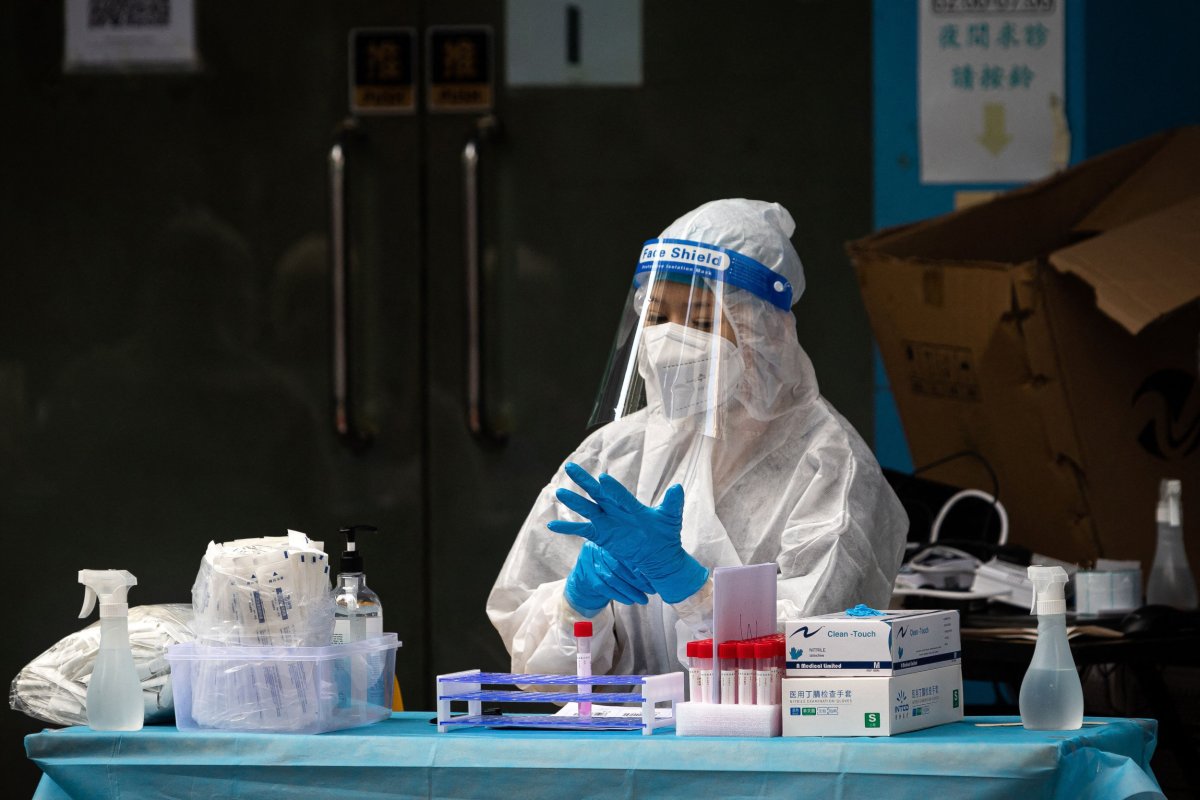Thousands of tourists found themselves locked inside Shanghai Disney Resort until late on Monday following a snap lockdown and park-wide testing for COVID-19.
Videos circulating on Weibo and Red—popular social media apps in China—appeared to show visitors sprinting toward the exits at Shanghai Disneyland, only to find them locked.
Newsweek wasn't able to independently verify the footage. In a notice just before noon local time on Monday, the resort said it would shut down Disneyland and its surrounding areas to comply with COVID-19 regulations.
The Shanghai government said there would be no entry to the resort, while only those who returned negative test results could leave.
Disney didn't respond to an inquiry about the exact number of tourists still inside the park at the time. Media reports estimated up to 20,000 guests were locked in when the announcement was made. Subsequent clips posted online throughout the day showed police cordons and long lines as visitors took part in mandatory mass testing.
In a notice on Tuesday, Shanghai's health authority said four COVID-19 infections were detected on October 31, two of whom were asymptomatic. Three of the four people tested positive while in quarantine.
All guests at the Disney resort had left the grounds by 10:30 p.m., it said. Tourists who had visited the park since October 27 were required to test for the virus three times in three days.
In a statement on its website, Shanghai Disney Resort apologized for the closure and offered refunds and coupons. It said it was unable to confirm when the park would reopen.

Over the weekend, Shanghai Disneyland was already operating at reduced capacity following an uptick in COVID-19 cases in major cities across China. New infections increased by several thousand a day—considered high by Chinese standards, given the country's zero-COVID policy.
The resort was among the first to shut in late January 2020 before reopening in May that year. Last November, some 30,000 people were trapped inside Shanghai Disneyland after a case of COVID-19 led to widespread contact tracing.
The park was shut for over three months earlier this year as part of Shanghai's city-wide lockdown affecting some 25 million people.

Beijing is sticking with its policy of stamping out every outbreak as part of its years-long zero-COVID policy, which has grown unpopular in certain quarters and stunted China's economic growth. It's Chinese leader Xi Jinping's signature public health strategy.
At the Chinese Communist Party Congress last month, where Xi was reappointed the country's leader for five more years, China's president argued zero COVID was the best way to balance public health and the economy.
Jane Duckett, a professor of Chinese politics at the University of Glasgow, said China has consistently sought to "contain even the smallest outbreaks" with strict and localized measures this year.
"There is inevitably some local variation in how the measures are implemented: some localities are more cautious than others," Duckett told Newsweek. "So far the measures are being sustained, but at an economic cost, but it is a price that the Party-state seems willing to pay."
"Presumably the pressure will build if the current approach is maintained, though three percent growth is better than many countries are managing at present," she said.
Elsewhere, iPhone-maker Foxconn continues to be scrutinized over an outbreak at a factory in Zhengzhou, in central China's Henan province, where the company has yet to disclose the number of infected workers.
Unverified social media videos appeared to show an exodus of thousands of workers—mostly on foot—who tried to escape quarantine in their dormitories. In response, local authorities said the situation was manageable, and that the company was organizing transport home for those who didn't wish to stay.
Workers have broken out of #Apple’s largest assembly site, escaping the Zero #Covid lockdown at Foxconn in #Zhengzhou. After sneaking out, they’re walking to home towns more than 100 kilometres away to beat the Covid app measures designed to control people and stop this. #China pic.twitter.com/NHjOjclAyU
— Stephen McDonell (@StephenMcDonell) October 30, 2022
Foxconn, which makes a range of electronics for Apple and others, said in a statement on Tuesday that no deaths had been reported at its facility.
Yanzhong Huang, a senior fellow for global health at the Council on Foreign Relations, told Newsweek last month that the panic surrounding COVID-19 outbreaks was largely related to the Chinese government's messaging around the virus, which is still being depicted as an existential threat.
Huang observed on Twitter: "The Foxconn fiasco suggests that de-demonizing Covid/destigmatizing infected people and their close contacts in China is important not only for future reopening but also for effectively implementing the zero-Covid policy itself."
Huang had previously predicted Beijing could maintain its zero-COVID policy until March 2023, when Xi is expected to retain his title as president at another major political event.
Update 11/1/2022 8:20 a.m. ET: This story has been updated with additional information.
Uncommon Knowledge
Newsweek is committed to challenging conventional wisdom and finding connections in the search for common ground.
Newsweek is committed to challenging conventional wisdom and finding connections in the search for common ground.
About the writer
John Feng is Newsweek's contributing editor for Asia based in Taichung, Taiwan. His focus is on East Asian politics. He ... Read more





